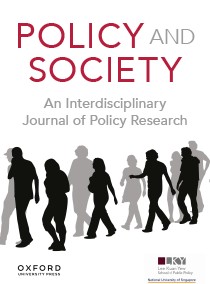当指标失败时:SPAR,流行病防范的无形措施
IF 6.1
1区 社会学
Q1 POLITICAL SCIENCE
引用次数: 4
摘要
最近关于指标作为全球治理技术的文献表明,数字在塑造知识和政策重点方面具有强大的力量。但并非所有指标都有强大的影响;有些人仍然看不见。这样的指标是强大指标的反面吗?是否同样的过程间接行使权力间接达到社会和经济的效果?本文探讨了可持续发展目标(SDG)指标3.d的案例。1 .建设国家大流行病防范能力的具体目标(具体目标3d),作为无形指标的个案研究。尽管该指标在2019冠状病毒病(COVID-19)大流行的背景下具有相关性,但它几乎没有牵引力。本文通过认知基础结构的框架探讨了解释这一悖论的原因。报告认为,缔约国自我评估报告(SPAR)得分这一指标对于全球卫生界有影响力的行为者来说是一个不方便的工具,因为它对COVID-19应对绩效的预测结果极其糟糕。它不仅会暴露出领导大流行防范政策议程的强国的失败,而且还会暴露出它们的专门知识和作为管理健康风险方法的全球卫生安全范式的合法性。该分析强调了全球治理中权力与指标使用之间的紧密关系。虽然强大的行为体越来越多地使用指标来重新制定政策叙述,但大流行病防范的指标一直不可见,以维持其现有框架。因此,它说明了认知基础设施中权力结构的弹性。本文章由计算机程序翻译,如有差异,请以英文原文为准。
When indicators fail: SPAR, the invisible measure of pandemic preparedness
Recent literature on indicators as technology of global governance has shown the power of numbers in shaping knowledge and policy priorities. But not all indicators have powerful effects; some remain invisible. Are such indicators an obverse of powerful indicators? Are the same process of indirect exercise of power to indirectly achieve social and economic effects at work? This paper explores the case of Sustainable Development Goal (SDG) indicator 3.d.1 for the target to build national capacity for pandemic preparedness (target 3d) as a case study of invisible indicators. This indicator has had little traction, despite its relevance in the context of the Coronavirus disease 2019 (COVID-19) pandemic. The paper explores the reasons that explain this paradox through the framework of epistemic infrastructures. It argues that the indicator—the State Party Self-Assessment Report (SPAR) score—was an inconvenient tool for the powerful actors in the global health community as it turned out to be an extremely poor predictor of COVID-19 response performance. It would have exposed not only the failings of the powerful countries that lead the policy agenda for pandemic preparedness but also the legitimacy of their expertise and the paradigm of global health security as an approach to governing health risks. The analysis highlights the tight relationship between power and the use of indicators in global governance. While indicators are increasingly used by powerful actors to reframe policy narratives, the indicator of pandemic preparedness has been kept invisible to maintain their existing framing. It thus illustrates the resilience of power structures in epistemic infrastructures.
求助全文
通过发布文献求助,成功后即可免费获取论文全文。
去求助
来源期刊

Policy and Society
Multiple-
CiteScore
18.00
自引率
6.50%
发文量
43
审稿时长
30 weeks
期刊介绍:
Policy and Society is a prominent international open-access journal publishing peer-reviewed research on critical issues in policy theory and practice across local, national, and international levels. The journal seeks to comprehend the origin, functioning, and implications of policies within broader political, social, and economic contexts. It publishes themed issues regularly and, starting in 2023, will also feature non-themed individual submissions.
 求助内容:
求助内容: 应助结果提醒方式:
应助结果提醒方式:


